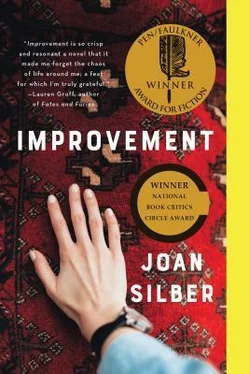“In Turkey you have to know how to bargain,” my aunt said over the phone. She was congratulating herself for getting a deal on her cable bill. She had threatened to change companies—“you always have to be willing to walk away”—and they had come down on her monthly rate.
Kiki was a more practical person than I was. “You manage fine,” she said.
And then I made the mistake of telling my aunt I needed to raise money for something. “I know it’s weird,” I said. “But it’s just that I have someone I want to send money to.”
“Boyd?”
“Oh, no,” I said.
“Men who need money are trouble,” Kiki said.
“It’s not for Boyd,” I said. “You think everything is about men.”
“I do not,” Kiki said.
“It’s for my friend, Lynnette,” I said. “You don’t know her.”
“You must be a good friend,” Kiki said.
I wondered if Kiki thought we were lovers, the way she said this. But, no, she was off on a riff about loyalty, how important it was. Fierce loyalty. “That’s how the Kurds survived for two and a half thousand years, while the Hittites and the Phrygians died out. Communal loyalty. Did you know that?”
I didn’t.
“Whatever you hear about Kurds, I’ve known some fine ones.”
I hadn’t heard anything.
“Oh,” my aunt said, “I’ve been with Pat too much.”
Was my aunt stuck in the past? I had a second of wondering whether, thirty-odd years from now, I was going to be muttering about high and low cigarette taxes. Was that what happened to old love, it turned into floating opinions and overcharged facts? I supposed I thought of Osman and any others as built into the wall of my aunt, like workers killed building the pyramids. Kiki would not have liked this comparison. I thought my aunt was a great example of someone who did fine living alone, but I didn’t want to be my aunt.
I had a lot of friends who didn’t have TVs anymore, they only watched programs on their computers, but Oliver and I were huge fans of the big fat TV that landed in our living room when Boyd started raking in cash. My whole life I never worried enough about money, people said I was careless about finances, but I could love objects. One thing I was sure of: Boyd was never coming back for the TV. He was a person who hated stingy gestures, who liked openhandedness and no looking back. Had I learned anything from him?
In his early days at the diner, Boyd came home doing sarcastic impressions of all the customers who counted out tips in pennies. Nothing more pathetic than leaving pennies on the table. But then Wiley was always a big tipper, wherever he went, so it wasn’t everything.
I knew how I was going to raise the money for Lynnette. I was going to sell the one thing of value I had, which was the carpet that my aunt had given me. Unless it wasn’t worth enough to sell, which was certainly possible.
I did what anyone would do; I looked online. I pulled up ads, I looked at eBay and 1stdibs and even Sotheby’s. I thought I knew what kind it was—my aunt always said Kula, which was a place—and some of the rugs that came up under Kula looked like mine and some didn’t at all. Selling for nineteen thousand dollars, selling for a hundred dollars, best offer. Depending on what?
Mine was big, which was a good thing. Beautiful, of course—brown and blue and a pale shrimpy yellow—with a diamond medallion in the center and border designs of clovers for luck and what Kiki had once told me were gold scales, to measure sins and good deeds for the next world. How perfect. The carpet wasn’t new, obviously, but I had no idea how old or how many knots per square inch or any of the other crap I read about.
I folded it up and took it to a rug assessor. Google knew where they were. I picked a guy in the West Thirties I thought wouldn’t be too fancy, but he was fancy enough, white-haired and elegantly bossy. His shop was just aisles of rugs, in piles as tall as he was. He unfurled mine on a table, stared at it, stroked the nap, looked at the underside. “Where did you get this?” A girl with tattoos like me.
It turned out to be in very good condition for how old it was, which was older than it looked. Maybe 1900, no moth holes, no worn spots. Faded, but natural dyes did that, and natural was good. Did I know the golden yellow was from buckthorn? “For insurance,” he said, “you could put maybe five thousand if you want.”
I let out a little gasp of surprise, and I realized I hadn’t loved the rug enough. It was like the nerdy kid in the class who becomes a movie star; you have to say you always knew he was cool.
Oliver liked to roll his trucks over the pattern of the carpet, but I didn’t think we would miss it so much. Kiki would be insulted and disappointed in me when she heard. I would have to block out a story about the glories of friendship, my loyalty. My friend Lynnette, she’s had a hard time with her family, I can’t begin to tell you, very bad situation, a friend has to do things, if you knew her, you’d understand.
So I took some photos and listed it on eBay for $4,900 and waited. No response the first day. I kept checking. I edited my description, added that the town of Kula was an important rug-making center, a phrase I took from the masses of info online.
At work people told me I looked less tired, more upbeat. “Staying at your aunt’s place was good, wasn’t it?” one of the techs said. “She must have a super apartment.”
If I was better, it was because I had a plan, I was in the midst of getting something done. For a change. The tech spoke to me as he was walking a dog out to its owner in the waiting area, an old black Lab named Scuffy whom I’d seen many times. The animal was heading toward his human with simple dog glee, pulling at the leash, openmouthed and smiling, and I thought how life was clearer with a goal.
How long was I going to have to wait? After a week, two people were “watching” my item but no offers. I wasn’t going any lower. Wasn’t I? I didn’t know what I was doing.
Of course, I saw the lunacy of acting as if money could fix what had happened, like tribesmen paying for a death by offering so many sheep. I didn’t tell anybody what I was doing so no one talked me out of it. It was a secret vigil I was keeping, a faith I invented. At work I checked my phone all the time—the screen as closet shrine. I sort of chanted to it, too—I heard myself say “come on” and “not yet?” and “oh, please.” It was no odder than the pleading many people did; I wasn’t begging a lover but an absent buyer, a stalling wallet.
I lowered the price to $4,800, why not, and that very night at 11:52 p.m. a message appeared that really, actually said someone bought the rug. It was a woman from Augusta, Maine—she was paying me seventy-five dollars to ship it to her—and the total sum would soon appear in my PayPal account, minus fees to eBay and PayPal. A done deal, here it was. Sold! What if I changed my mind, what if I never sent the carpet at all? I’d had it since Oliver was a baby. My aunt gave it to me.
I went through a very bad night, but by morning I remembered that selling the carpet was half of my idea—the other half was getting the money to Lynnette and would be much more pleasurable. I had to focus on the higher goal, the longer view. By the time I went to pick up Oliver that evening, the rug was gone. I’d moved the furniture off it, vacuumed it, folded and rolled it and wrapped it in plastic, and taken it to UPS. Oliver said, “We have wood on the floor,” and began jumping and tapping with his shoes, which he knew he wasn’t supposed to do.
Lynnette wasn’t yelling at people these days, but she was still Lynnette.
It was all too possible that she’d tear up a check or delete an email if she saw my name anywhere near it. She had her principles and her fury and she was more than capable of raging refusal, even when it meant cutting off her nose to spite her face. She’d walk around without a nose, no problem.
Читать дальше












